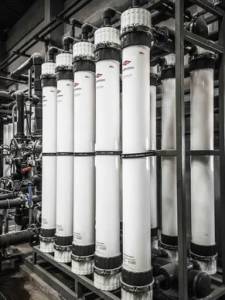Description
Ultrafiltration: Superior Liquid Purification for Diverse Applications
Ultrafiltration (UF) is a pressure-driven membrane process that effectively separates particles, macromolecules, and dissolved substances from liquids. This versatile technology offers a robust and efficient solution for various industries requiring high-quality purified liquids. Unlike other filtration methods, UF provides a superior balance of throughput, retention, and cost-effectiveness.
How it Works:
Ultrafiltration utilizes semi-permeable membranes with precisely defined pore sizes (typically ranging from 1 to 100 nanometers). When a liquid is forced under pressure across these membranes, smaller molecules and solvents pass through while larger particles and macromolecules are retained. This process effectively separates:
- Suspended Solids: Particles like silt, clay, bacteria, and algae are efficiently removed.
- Macromolecules: Proteins, polysaccharides, and other high-molecular-weight substances are retained.
- Colloids: Stable mixtures of finely dispersed particles are separated.
Key Benefits of Ultrafiltration:
- High Efficiency: UF achieves superior separation efficiency compared to traditional filtration techniques, removing a wider range of contaminants.
- Gentle Processing: The process is relatively gentle, minimizing damage to sensitive materials and preserving product quality.
- Reduced Chemical Usage: UF often reduces or eliminates the need for harsh chemicals, making it an environmentally friendly option.
- Scalability: UF systems are available in various sizes and configurations, making them suitable for small-scale laboratory applications to large-scale industrial processes.
- Versatile Applications: UF finds applications in numerous industries, as detailed below.
- Cost-Effective: While initial investment may vary, the long-term operational costs are often lower compared to alternative purification methods due to reduced chemical usage and maintenance.
- Automation Capabilities: Many UF systems can be automated, enabling consistent operation and reduced labor costs.
Applications Across Industries:
- Water Treatment: Removal of turbidity, bacteria, and viruses in drinking water, wastewater treatment, and industrial process water purification.
- Pharmaceutical and Biotech: Purification of pharmaceuticals, biomolecules (e.g., proteins, enzymes), and cell culture media.
- Food and Beverage: Clarification of juices, wine, beer, and dairy products; concentration of proteins and other valuable components.
- Chemical Processing: Separation and purification of various chemicals, removal of unwanted byproducts.
- Oil and Gas: Treatment of produced water, removal of contaminants from drilling fluids.
Membrane Materials:
Various membrane materials are employed in UF, each offering unique properties and suitability for specific applications. Common materials include:
- Polyethersulfone (PES): Offers high flux and good chemical resistance.
- Polyvinylidene fluoride (PVDF): Excellent chemical resistance and high temperature tolerance.
- Regenerated cellulose: Biocompatible and suitable for food and pharmaceutical applications.
Choosing the Right Ultrafiltration System:
Selecting the appropriate UF system depends on factors such as:
- Feed characteristics: The type and concentration of contaminants in the feed liquid.
- Desired permeate quality: The level of purification required.
- Throughput requirements: The volume of liquid to be processed per unit time.
- Operating pressure: The pressure required to achieve the desired separation.
Conclusion:
Ultrafiltration is a powerful and versatile technology offering superior liquid purification across various industries. Its efficiency, gentle processing, and cost-effectiveness make it a compelling solution for achieving high-quality purified liquids. Contact us to discuss your specific application and determine the optimal UF solution for your needs.
